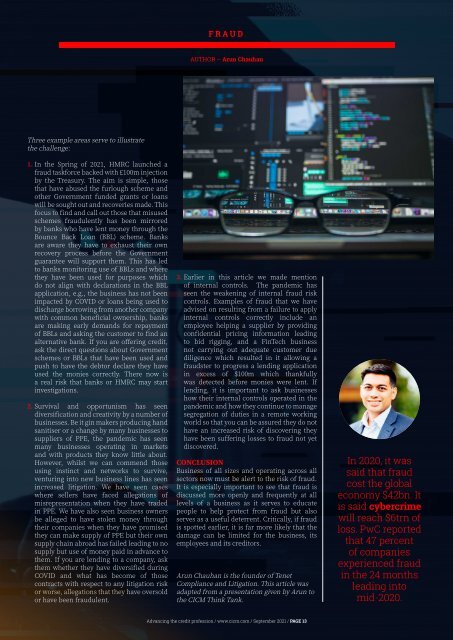CM September 2021
Create successful ePaper yourself
Turn your PDF publications into a flip-book with our unique Google optimized e-Paper software.
FRAUD<br />
AUTHOR – Arun Chauhan<br />
Three example areas serve to illustrate<br />
the challenge:<br />
1. In the Spring of <strong>2021</strong>, HMRC launched a<br />
fraud taskforce backed with £100m injection<br />
by the Treasury. The aim is simple, those<br />
that have abused the furlough scheme and<br />
other Government funded grants or loans<br />
will be sought out and recoveries made. This<br />
focus to find and call out those that misused<br />
schemes fraudulently has been mirrored<br />
by banks who have lent money through the<br />
Bounce Back Loan (BBL) scheme. Banks<br />
are aware they have to exhaust their own<br />
recovery process before the Government<br />
guarantee will support them. This has led<br />
to banks monitoring use of BBLs and where<br />
they have been used for purposes which<br />
do not align with declarations in the BBL<br />
application, e.g., the business has not been<br />
impacted by COVID or loans being used to<br />
discharge borrowing from another company<br />
with common beneficial ownership, banks<br />
are making early demands for repayment<br />
of BBLs and asking the customer to find an<br />
alternative bank. If you are offering credit,<br />
ask the direct questions about Government<br />
schemes or BBLs that have been used and<br />
push to have the debtor declare they have<br />
used the monies correctly. There now is<br />
a real risk that banks or HMRC may start<br />
investigations.<br />
2. Survival and opportunism has seen<br />
diversification and creativity by a number of<br />
businesses. Be it gin makers producing hand<br />
sanitiser or a change by many businesses to<br />
suppliers of PPE, the pandemic has seen<br />
many businesses operating in markets<br />
and with products they know little about.<br />
However, whilst we can commend those<br />
using instinct and networks to survive,<br />
venturing into new business lines has seen<br />
increased litigation. We have seen cases<br />
where sellers have faced allegations of<br />
misrepresentation when they have traded<br />
in PPE. We have also seen business owners<br />
be alleged to have stolen money through<br />
their companies when they have promised<br />
they can make supply of PPE but their own<br />
supply chain abroad has failed leading to no<br />
supply but use of money paid in advance to<br />
them. If you are lending to a company, ask<br />
them whether they have diversified during<br />
COVID and what has become of those<br />
contracts with respect to any litigation risk<br />
or worse, allegations that they have oversold<br />
or have been fraudulent.<br />
3. Earlier in this article we made mention<br />
of internal controls. The pandemic has<br />
seen the weakening of internal fraud risk<br />
controls. Examples of fraud that we have<br />
advised on resulting from a failure to apply<br />
internal controls correctly include an<br />
employee helping a supplier by providing<br />
confidential pricing information leading<br />
to bid rigging, and a FinTech business<br />
not carrying out adequate customer due<br />
diligence which resulted in it allowing a<br />
fraudster to progress a lending application<br />
in excess of $100m which thankfully<br />
was detected before monies were lent. If<br />
lending, it is important to ask businesses<br />
how their internal controls operated in the<br />
pandemic and how they continue to manage<br />
segregation of duties in a remote working<br />
world so that you can be assured they do not<br />
have an increased risk of discovering they<br />
have been suffering losses to fraud not yet<br />
discovered.<br />
CONCLUSION<br />
Business of all sizes and operating across all<br />
sectors now must be alert to the risk of fraud.<br />
It is especially important to see that fraud is<br />
discussed more openly and frequently at all<br />
levels of a business as it serves to educate<br />
people to help protect from fraud but also<br />
serves as a useful deterrent. Critically, if fraud<br />
is spotted earlier, it is far more likely that the<br />
damage can be limited for the business, its<br />
employees and its creditors.<br />
Arun Chauhan is the founder of Tenet<br />
Compliance and Litigation. This article was<br />
adapted from a presentation given by Arun to<br />
the CI<strong>CM</strong> Think Tank.<br />
In 2020, it was<br />
said that fraud<br />
cost the global<br />
economy $42bn. It<br />
is said cybercrime<br />
will reach $6trn of<br />
loss. PwC reported<br />
that 47 percent<br />
of companies<br />
experienced fraud<br />
in the 24 months<br />
leading into<br />
mid-2020.<br />
Advancing the credit profession / www.cicm.com / <strong>September</strong> <strong>2021</strong> / PAGE 13


















